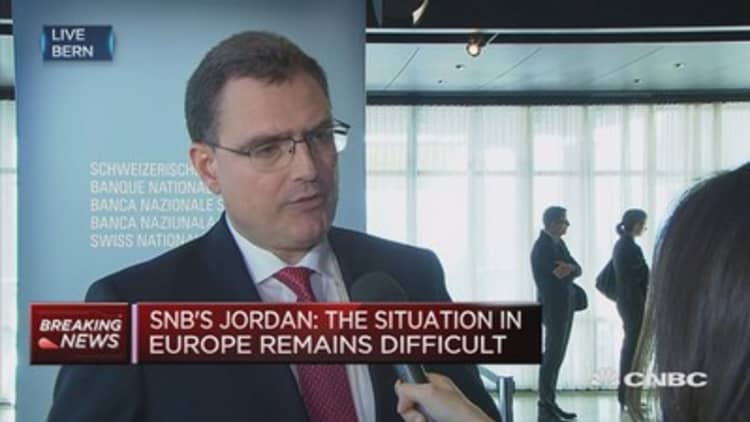
The Swiss National Bank's monetary policy framework must remain "expansionary" as concerns and uncertainties still lurk in Europe, its chairman explained to CNBC on Thursday.
"The situation in Europe remains more difficult and that's exactly the reason why monetary policy in Europe remains expansionary and that also means that we have to continue maintaining negative interest rates in Switzerland," Thomas Jordan, chairman of the Swiss National Bank, told CNBC Thursday.
Earlier, the Swiss central bank decided to stand pat on its monetary policy, leaving its interest rates unchanged at record-low levels. The SNB left its deposit rate at a negative 0.75 percent on Thursday, as was widely expected.
In the bank's latest statement, the SNB said it would remain active in the foreign exchange market, and that its current expansionary monetary policy is expected to help prop up economic activity and help keep an eye on the Swiss franc.
"Our monetary policy is expansionary and it has to remain expansionary because we still have a very difficult situation: We have negative inflation, we have a negative output gap and the Swiss franc remains significantly overvalued," he added.
Meanwhile, on Wednesday the U.S. Federal Reserve decided to raise interest rates by 25 basis points — the second time it had done so in a decade. While the market had already priced this in, investors weren't expecting three planned hikes for 2017. However, for the SNB's chairman, the Fed's recent moves highlight that the U.S. economy is on track.
"It's very positive that the U.S. economy is on track. The decision by the Fed shows that the situation is improving and this is a very positive sign, not only for Switzerland but for the world economy as a whole."
2016 has been a political and economic whirlwind for markets, businesses and countries worldwide, and political risk both inside and out of Europe is expected to linger in the coming year. Following the Brexit vote, the central bank confirmed that it had intervened in the currency market, after the Swiss franc came under upward pressure, Reuters reported.

Going forward, Jordan said the central bank would continue its strategy and would try to stabilize the currency in the case high volatility. In Thursday's policy release, the institution said the economic impact of the Brexit outcome however had "proved less pronounced than originally feared" at present.
Another area of unknown for the global economy is what a Donald Trump presidency may mean for the central bank and trade. The chairman said it was "too early" to provide a definite answer, yet added that the Swiss economy had a big interest in international trade and hoped for "no additional protectionist measures".
As 2017 approaches, the Swiss central bank's outlook remains "cautiously optimistic", forecasting GDP (gross domestic product) to grow around 1.5 percent for 2017 like it expected for 2016; yet the SNB did however trim its inflation expectations for 2017 and 2018.



